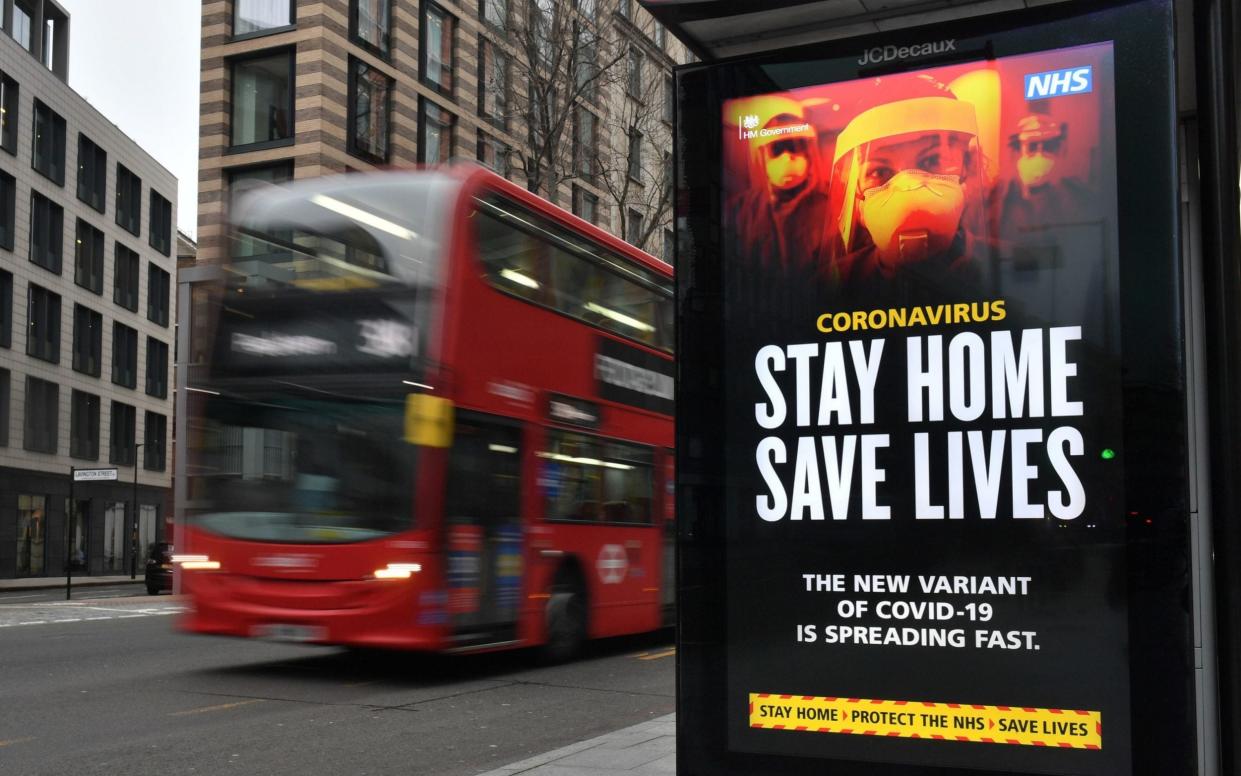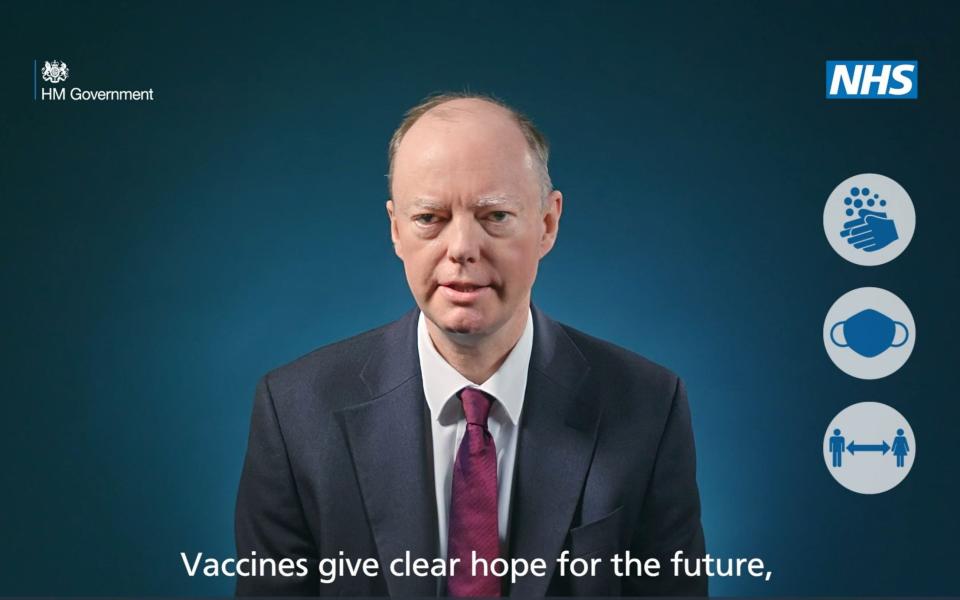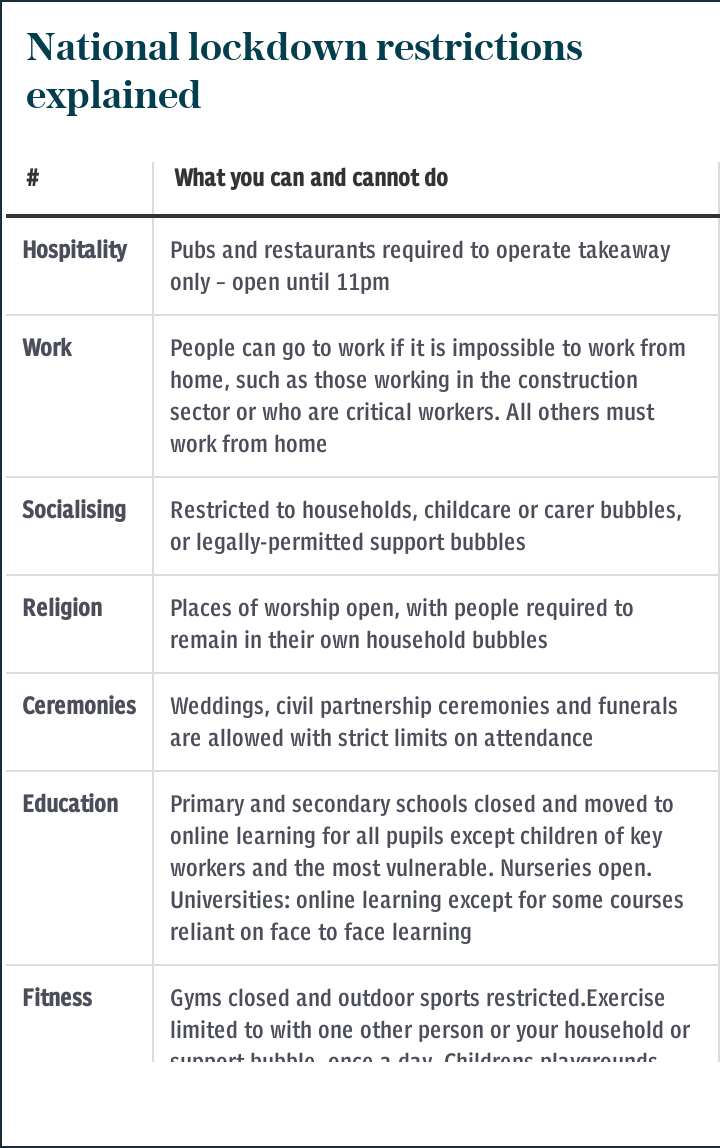Crackdown planned as Covid deaths hit record high


Ministers are considering a "tough crackdown" to pressure more Britons to stay at home after the daily coronavirus death toll hit a record high.
There is growing concern in Government over compliance with the latest lockdown after Covid cases continued to rise sharply, with one in 15 people now estimated to be infected in some parts of London. Rates in Liverpool and some other areas have almost quadrupled in a week.
A new hard-hitting Government advertising campaign, unveiled on Friday night, warned the public that if they leave their homes "people will die".
In a new television advertisement, Professor Chris Whitty, the chief medical officer, says: "Covid-19, especially the new variant, is spreading quickly across the country. This puts many people at risk of serious disease and is placing a lot of pressure on our NHS. Once more, we must all stay home."
The campaign urges people to "act like you've got it", adding that "anyone can spread it".

Boris Johnson issued a plea to the nation to obey the rules, saying doing so "is now more vital than ever" because the NHS faces "severe strain".
He warned against complacency based on the "renewed hope" offered by the vaccine rollout.
"Our hospitals are under more pressure than at any other time since the start of the pandemic, and infection rates across the entire country continue to soar at an alarming rate," the Prime Minister said.
The Telegraph understands that the Government is considering taking tougher enforcement action amid pressure from scientists and Labour politicians to introduce further restrictions.
On Friday, the UK recorded 1,325 virus deaths, its highest ever daily toll, surpassing the previous worst total of 1,224 at the peak of the first wave in April.
The 68,053 lab-confirmed cases of coronavirus is also the highest number reported by the Government in a single day since the beginning of the pandemic, although daily cases may have been higher in April when mass testing was not taking place.
Case rates rose in all 315 English local authority areas in the seven days to Monday, bar one – Richmond upon Thames. In another London borough, Barking and Dagenham, one in 15 people now have the virus, according to Public Health England (PHE).
Rishi Sunak, the Chancellor, is under pressure to do more to help small business workers who may be struggling to afford to stay at home, with Transport for London data showing that buses and trains were much busier than during the first lockdown.
On Friday, Mark Drakeford, the Welsh first minister, announced that he would be introducing tougher coronavirus restrictions, including tighter social distancing and capacity measures in supermarkets.
It comes as schools were reportedly inundated with the children of key workers at much higher rates than during the first lockdown, raising fears that Covid will continue to spread in classrooms.
The new adverts, which will appear on the television, radio and social media, appeal to the public's conscience. One features a man in a hospital bed and says: "If you go out you can spread it. People will die." Others stress that the hyper-infectious Covid variant is spreading fast, and that one in three people with it do not have symptoms but can pass it on.
Ministers are increasingly concerned about compliance with the lockdown but believe there are few additional major options left to tighten the restrictions any further.
"There's not a lot more that we can do," said a Government source. We've put in these very tough national restrictions. It is a lockdown for everyone all the time." The source stressed that the focus now was on persuading the public to obey the current rules.
Heavier-handed enforcement remains a lever the Government could pull, however. Police forces are already stepping up their role, having said this week that they will take a stricter approach to the latest lockdown.
Government insiders pointed out that the blanket lockdown rules are simpler – and should therefore be easier to police – than the tiers system.

However, Downing Street faces pressure to implement tougher restrictions. On Friday, the London Mayor, Sadiq Khan, called for face masks to be worn outside the home, including in supermarket queues, and demanded that churches and other places of worship be closed.
Asked about the latter suggestion, Michael Gove, the Cabinet Office minister, said: "It's absolutely vital that traditions of public worship can continue, and I think it's a very important part of the life of the nation."
A senior scientific adviser to the Government warned on Friday that the third lockdown is unlikely to bring cases down, saying deaths would only begin to fall again once enough people have been vaccinated.
Experts are now expecting the epidemic to rise to a peak and then plateau because the new UK Covid variant is so infectious that it is impossible to bring the 'R' number below one with the current measures.
Government scientists have also advised that the two-metre social distancing rule should be reinstated. A source said: "Whilst we moved to one metre plus as being ok, in fact with the new variant one metre becomes less OK and two metres is better."
Mr Khan declared a major incident in London as the coronavirus infection rate in the capital exceeded 1,000 per 100,000 people – a 27 per cent increase in hospital patients between December 30 and January 6. There are now more than 7,000 people in hospital with Covid, a 35 per cent increase compared to the previous peak of the pandemic.
The triggering of major incident status – defined as a situation requiring a special response by the emergency services – came the day after Sussex and Surrey took the same step. It was previously triggered in the capital after the London Bridge terror attack and the Grenfell Tower fire disaster, both of which happened in June 2017.
The latest NHS Test and Trace data shows that people with the UK variant pass the virus on to 15 per cent of their close contacts, compared to just 11 per cent for those with the original virus.
A source close to the Government said: "With the increased transmission, the measures won't slam the 'R' down as effectively as they did in March so it may look a bit flatter. We may well stick at a plateau for quite a long time, rather than a peak and decrease.
"Once all the care homes are vaccinated, you would expect the death rate to come down, maybe in February some time, and you might expect to see that from the hospitalisation a bit later.
"If the vaccination programme rolls out really effectively and the vaccines behave as well as they've done in trials, then you start to see a real opportunity to start easing things off a bit over the summer and spring.
"But then you may need to have something reintroduced next winter and you think about things like mask wearing and social distancing to make sure that we don't we don't give the virus a chance to spread again."
New data from PHE shows the UK variant is now the dominant strain in Britain, accounting for 80 per cent of all cases.

 Yahoo News
Yahoo News 
